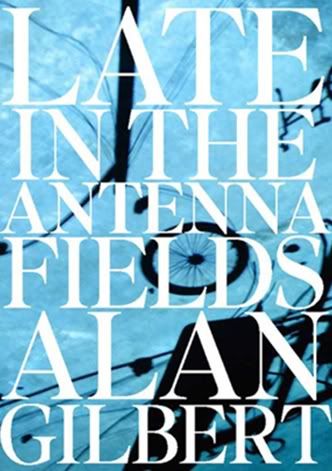
Late in the Antenna Fields, Alan Gilbert's first collection of poetry, which was published by Future Poem, allows for readers to “recover...the scattered bits” of language found throughout the book so as to form them into any number of disparate readings. Moreover, as the second section of the poem "Transdermal Express" explains, no individual reading proposed by a particular reader (at least those readings that are grounded within the text itself) offers a more relevant reading than another “because / there's no big picture, / only small ones / on screens in various / configurations.” In many ways, this echoes Lyotard's belief that, in the postmodern world and beyond (i.e. the world today), there are no more master narratives. What follows, then, are three “configurations” cobbled together from “scattered bits” of Gilbert's collection that provide different ways of conceptualizing his book:
1) Toward the beginning of Alan Gilbert's Late in the Antenna Fields, readers discover that noise transforms into “the language of supermarket / shelves mixed in a Google spittoon and smelling like a global-style sunscreen / tossing live grenades / or handfuls of trail mix / over a volleyball net used / by boys.” In many respects, this passage provides us with an understanding of the world the poems in this collection explore: one constructed upon a hyper-commercialized language founded in a digitally-based, global-economy employed by its practitioners for both entertainment and destruction. Of course, if this is the case, the question becomes: how does this language function and what does one do with it? It would appear that in the frenzy of super-saturated informational and communicative outlets the world populace confronts on a daily-basis (i.e. the Internet and 24-hour news broadcasts), we find our answer; as the speaker of “Every 20-Gallon Jar of Pickles Contains a Free” states, this new language is for “remembering then forgetting / again, the quick flash of history.” To wit, the deluge of words and images offers the reader a moment of recognition, only for that moment to vanish as he/she engages the next image or word, then the one that follows, proceeding such until the end of the collection, which is to say that “the media eats the media” and “the processed is processed before we get to it.”
2) “I'm mostly okay with the verbs and objects, / less so with the subjects,” says the speaker of Alan Gilbert's “Healing Hearts Through the Arts” in Late in the Antenna Fields. Perhaps the anxiety voiced by the speaker of this poem stems from the fact that the contemporary subject is an aesthetic body built for and with the newly aestheticized world, an all-encompassing cosmetic surgery meant to reconcile the subject with the objects that surround it. Such a subject unsettles the speaker not because it lacks an authentic or unique identity, but due to the fact that, in today's world, we champion this absence so much so that a subject seeks “not just an organ transplant // but the whole human”: a construction so fully synthetic that “the aging family dog [is] no longer able to / distinguish between a piece of leftover steak and the hand / proffering it.” And once the world and those who populate it become fully synthetic, we'll be left with the knowledge that “Something living / once inhabited / [our] shells,” but any “attempt to get at / the real” (i.e. what we once were) will be futile because “the real can't be got / at” anymore. Of course, the anxiety over these new constructions is tempered with a self-implicating realization when the speaker of “Every Once in a While I am Permitted” acknowledges that “I still want to make things / and change things.” Not satisfied with subjectivities of the past, he must replace them with a newly simulated being of his own construction.
3) While eco-critics and scholars have argued over the culture/nature binary ad nauseum, Alan Gilbert's Late in the Antenna Fields suggests that such debates are moot, if not wholly unwarranted, due to the fact that nowadays “We live with contradictions.” What does it matter if we label something “cultural” or “natural”? Why cannot a particular entity be both? The book's ambivalence toward the aforementioned binary manifests itself throughout the collection in a preponderance of images that conflate the natural with the cultural and the cultural with the natural. In the incipient poem “The World One Summer,” readers will find that the speaker's “daughter fixes the sun to the sky,” thus providing agency to humans in the construction of the natural world. But the book does not stop there; in the next poem, “Outpatient Procedure” there are “tumbleweed assembly lines” used to “produce Escalade interiors.” Later in the collection, we “hear the sound of crickets chirping, / as talk show hosts interview hospice workers,” “clouds [are] specially / flown in for [an] occasion,” and scattered throughout we find an “automated / wave machine,” “a wind tunnel,” “rivers with antifreeze,” “an ebbing river of concrete,” “Emergency lights flash[ing] in the forest,” an “artificial plant,” “a rhythm to the hills accompanied / by the right air-conditioned soundtrack / blurring the landscape in clouds of exhaust,” and earphones that “leak with digital bird songs,” just to name a few. To wit, the culture/nature binary does not sustain itself in Late in the Antenna Fields, but instead flourishes in the joyous world of both, wherein everything is culture and nature.

No comments:
Post a Comment